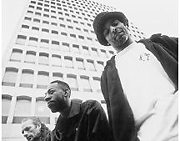ONE CHILLY EVENING in San Francisco several years ago, I bounced around the unheated apartment of singer/songwriter Barbara Manning, trying both to stay warm and discern what obscure Pavement B-side she was playing on her stereo. An amateur musicologist herself (and a friend of Byron Coley, a pro musicologist who’d enlisted her help to coauthor a Spin article on unknown international artists), she didn’t ridicule me for thinking that the laconic melody and murky recording belonged to Pavement. This was Zen, Barbara explained, an underground Turkish band that’s part of a small but productive indie-rock scene in the Middle East.
Smith & Mighty
I-Spy, Saturday, April 22
How these musicians heard and in turn were influenced by American and English rock mystified me. But then, that’s the magic of music: As affected as it is by geography and culture, it can traverse borders unscathed by potentially harmful elements such as politics and can even transform into groundbreaking genres in a new setting.
Such was the case in the mid-’80s, when a few musicians in England’s coastal/ industrial town of Bristol began fusing their beloved Jamaican styles with pop and, gradually, with nascent electronic beats and hip-hop. This would seed the most fertile musical soil of the late ’90s, allowing Bristolian acts like Massive Attack, Tricky, Portishead, Beth Orton, and Roni Size to bloom. Among those present from the outset were Rob Smith and Ray Mighty, as well as the eventual third member of their Smith & Mighty ensemble, Peter D. Rose.
On the phone from his home in Bristol, Rose notes that neither he nor his cohorts had ever been to Kingston or the Bronx when they began incorporating reggae and hip-hop into their earliest songs, but they had blood ties to the music.
“We got the whole Jamaican influence because my parents were Jamaican, one-half of Ray’s parents is Jamaican, and Rob grew up in a Jamaican community in Bristol,” Rose says. “I grew up with reggae around me, ska and dub, and rockers music, which is the old term for reggae.” The surge in popularity of sound systems—mobile DJ teams with rotating MCs— in Jamaica during the early ’80s spread to England via cassettes and inspired folks like Smith, Mighty, and Soul II Soul’s Nellee Hooper to try their hand.
Smith & Mighty went on to record a series of 12-inches, including an attention-grabbing cover of Bacharach and David’s “Walk on By” that helped garner the then-duo a contract with London Records in 1992. A year later, the recording of their debut became mired in a morass of disputes with the record company; Bristol peers influenced by Smith & Mighty released albums in the interim, with Tricky and Massive Attack inadvertently nudging their mentors out of the limelight.
THE DUO MADE the best of the situation, however, inviting Rose into the fold and prying Bass Is Maternal from the vaults in 1998 for release on their newly minted More Rockers label. Since then, Smith & Mighty’s made up a lot of lost ground, signing to Germany’s respected K7 label (which has a New York office as well) and issuing a ’98 DJ mix-CD and this year’s ambitious collage of reggae, dub, hip-hop, drum-and-bass, and soul, Big World Small World.
Rose insists that despite the high-profile status that’s engulfed anything out of Bristol, Smith & Mighty didn’t pressure themselves to make a musical statement that would assert their rightful place as pioneers.
“Massive Attack had one story. Roni Size had one story. And this is our story,” he says. “There’s no grudges or jealousy. I mean, we’d probably like to have their money, but there’s no malice or nothing like that.” Rose adds that the Bristol scene, often likened to Seattle’s, has survived despite the onset of scrutiny, record deals, and fame. “Everybody was kinda like friends trying their thing in music from way back. So anybody who became successful from Bristol, we have full appreciation for that. We all still speak, and we still have that community vibe here.”
Without the big-money support that some of these friends enjoy, Smith & Mighty are forced to economize when they undertake American tours. When they last appeared in Seattle more than a year ago at ARO.space, they mostly worked the turntables; still, they performed an energetic, danceable set.
Rose hints that their current jaunt will be a more visceral and even educational experience. “We’ve been doing a live PA in a sound system style. We start off doing a DJ sort of set of slow dub, then we’ll go into a breakbeat thing, and the vocalists will come on, and we’ll do a few tracks from the album,” he says, adding that MCs should include the record’s Tammy Payne, Rudy Lee, L.D., and Kelz. “And after that we’ll finish off with a drum-and-bass set. Basically it’s a straight progression . . . a sort of history lesson from dub into hip-hop with a soul/dub vibe into drum-and-bass.”
In other words, it’ll be a musical field trip with a variation on a familiar theme: It’s a small world after all.






